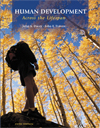 |  Human Development Across the Lifespan, 5/e John S. Dacey,
Boston College
John F. Travers,
Boston College
Middle Childhood Physical and Congitive Development in Middle Childhood
Learning ObjectivesAfter reading this chapter, the student should be able to complete the following goals:
1Summarize nutritional issues for children between the ages of 7 and 12. |
 |  |  | 2Characterize the changes in physical development and motor skills of girls and boys in middle childhood. |
 |  |  | 3Examine the features of concrete operational thinking. |
 |  |  | 4Discuss the contributions of Piaget and the criticisms of his theoretical approach to children's cognitive development. |
 |  |  | 5Summarize Binet's view of intelligence and Wechsler's tools to measure intelligence. |
 |  |  | 6List and describe Gardner's intelligences. |
 |  |  | 7Identify and describe the components of Sternberg's triarchic model of intelligence. |
 |  |  | 8Examine the issue of equity in testing for multicultural children. |
 |  |  | 9Discuss Bloom's taxonomy and how it relates to children and their thinking skills. |
 |  |  | 10Identify the critical issues in framing questions. |
 |  |  | 11Present the characteristics of good problem solvers and ways to improve children's problem-solving strategies. |
 |  |  | 12Identify the kinds of mistakes children make in problem solving. |
 |  |  | 13Examine problem-solving skills, including the use of the DUPE model. |
 |  |  | 14Examine the main issues of children's moral development and the role parents play. |
 |  |  | 15Identify Piaget's stages of how children conform to rules and describe Piaget's stages of moral development. |
 |  |  | 16State Kohlberg's six stages of moral reasoning and give an example of reasoning at each level. |
 |  |  | 17Discuss Gilligan's criticisms of Kohlberg's stages and summarize her theory of moral development. |
 |  |  | 18Identify changes in language usage during middle childhood. |
 |  |  | 19Compare the stage and nonstage theorist's explanation of the acquisition of reading skills. |
 |  |  | 20Identify strategies of maturing readers and identify Booth's levels of reading ability. |
|



 2002 McGraw-Hill Higher Education
2002 McGraw-Hill Higher Education